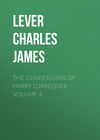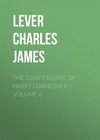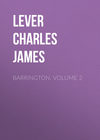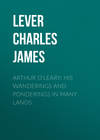Czytaj książkę: «The Confessions of Harry Lorrequer – Complete», strona 29
CHAPTER XXXVI.
WISE RESOLVES
Musing over this boyish adventure, I fell into a deep slumber, and on awakening it took me some minutes before I could recall my senses sufficiently to know where I was. The whole face of things in my room was completely changed. Flowers had been put in the china vases upon the tables — two handsome lamps, shaded with gauzes, stood upon the consoles — illustrated books, prints, and caricatures, were scattered about. A piano-forte had also, by some witchcraft, insinuated itself into a recess near the sofa — a handsome little tea service, of old Dresden china, graced a marquetry table — and a little picquet table stood most invitingly beside the fire. I had scarcely time to turn my eyes from one to the other of these new occupants, when I heard the handle of my door gently turn, as if by some cautious hand, and immediately closed my eyes and feigned sleep. Through my half-shut lids I perceived the door opened. After a pause of about a second, the skirt of a white muslin dress appeared — then a pretty foot stole a little farther — and at last the slight and graceful figure of Emily Bingham advanced noiselessly into the room. Fear had rendered her deadly pale; but the effect of her rich brown hair, braided plainly on either side of her cheek, suited so well the character of her features, I thought her far handsomer than ever. She came forward towards the table, and I now could perceive that she had something in her hand resembling a letter. This she placed near my hand — so near as almost to touch it. She leaned over me — I felt her breath upon my brow, but never moved. At this instant, a tress of her hair, becoming unfastened, fell over upon my face. She started — the motion threw me off my guard, and I looked up. She gave a faint, scarce audible shriek, and sank into the chair beside me. Recovering, however, upon the instant, she grasped the letter she had just laid down, and, having crushed it between her fingers, threw it into the fire. This done — as if the effort had been too much for her strength — she again fell back upon her seat, and looked so pale I almost thought she had fainted.
Before I had time to speak, she rose once more; and now her face was bathed in blushes, her eyes swam with rising tears, and her lips trembled with emotion as she spoke.
"Oh, Mr. Lorrequer, what will you — what can you think of this? If you but knew — ;" and here she faltered and again grew pale, while I with difficulty rising from the sofa, took her hand, and led her to the chair beside it.
"And may I not know?" said I; "may I not know, my dear" — I am not sure I did not say dearest — "Miss Bingham, when, perhaps, the knowledge might make me the happiest of mortals?"
This was a pretty plunge as a sequel to my late resolutions. She hid her face between her hands, and sobbed for some seconds.
"At least," said I, "as that letter was destined for me but a few moments since, I trust that you will let me hear its contents."
"Oh no — not now — not now," said she entreatingly; and, rising at the same time, she turned to leave the room. I still held her hand, and pressed it within mine. I thought she returned the pressure. I leaned forward to catch her eye, when the door was opened hastily, and a most extraordinary figure presented itself.
It was a short, fat man, with a pair of enormous moustaches, of a fiery red; huge bushy whiskers of the same colour; a blue frock covered with braiding, and decorated with several crosses and ribbons; tight pantaloons and Hessian boots, with long brass spurs. He held a large gold-headed cane in his hand, and looked about with an expression of very equivocal drollery, mingled with fear.
"May I ask, sir," said I, as this individual closed the door behind him, "may I ask the reason for this intrusion?"
"Oh, upon my conscience, I'll do — I'm sure to pass muster now," said the well-known voice of Mr. O'Leary, whose pleasant features began to dilate amid the forest of red hair he was disguised in. "But I see you are engaged," said he, with a sly look at Miss Bingham, whom he had not yet recognised; "so I must contrive to hide myself elsewhere, I suppose."
"It is Miss Bingham," said I, "who has been kind enough to come here with her maid, to bring me some flowers. Pray present my respectful compliments to Mrs. Bingham, and say how deeply I feel her most kind attention."
Emily rose at the instant, and recovering her self-possession at once, said —
"You forget, Mr. Lorrequer, it is a secret from whom the flowers came; at least mamma hoped to place them in your vases without you knowing. So, pray, don't speak of it — and I'm sure Mr. O'Leary will not tell."
If Mr. O'Leary heard one word of this artful speech, I know not, but he certainly paid no attention to it, nor the speaker, who left the room without his appearing aware of it.
"Now that she is gone — for which heaven be praised," said I to myself; "let me see what this fellow can mean."
As I turned from the door, I could scarcely avoid laughing aloud at the figure before me. He stood opposite a large mirror, his hat on one side of his head, one arm in his breast, and the other extended, leaning upon his stick; a look of as much ferocity as such features could accomplish had been assumed, and his whole attitude was a kind of caricature of a melo-dramatic hero in a German drama.
"Why, O'Leary, what is all this?"
"Hush, hush," said he, in a terrified whisper — "never mention that name again, till we are over the frontier."
"But, man, explain — what do you mean?"
"Can't you guess," said he drily.
"Impossible; unless the affair at the saloon has induced you to take this disguise, I cannot conceive the reason."
"Nothing farther from it, my dear friend; much worse than that."
"Out with it, then, at once."
"She's come — she's here — in this very house — No. 29, above the entre sol."
"Who is here, in No. 29, above the entre sol?"
"Who, but Mrs. O'Leary herself. I was near saying bad luck to her."
"And does she know you are here?"
"That is what I can't exactly say," said he, "but she has had the Livre des Voyageurs brought up to her room, and has been making rather unpleasant inquiries for the proprietor of certain hieroglyphics beginning with O, which have given me great alarm — the more, as all the waiters have been sent for in turn, and subjected to long examination by her. So I have lost no time, but, under the auspices of your friend Trevanion, have become the fascinating figure you find me, and am now Compte O'Lieuki, a Pole of noble family, banished by the Russian government, with a father in Siberia, and all that; and I hope, by the end of the week, to be able to cheat at ecarte, and deceive the very police itself."
The idea of O'Leary's assuming such a metamorphosis was too absurd not to throw me into a hearty fit of laughing, in which the worthy emigre indulged also.
"But why not leave this at once," said I, "if you are so much in dread of a recognition?"
"You forget the trial," added O'Leary, "I must be here on the 18th or all my bail is forfeited."
"True — I had forgot that. Well, now, your plans?" —
"Simply to keep very quiet here till the affair of the tribunal is over, and then quit France at once. Meanwhile, Trevanion thinks that we may, by a bold stratagem, send Mrs. O'Leary off on a wrong scent, and has requested Mrs. Bingham to contrive to make her acquaintance, and ask her to tea in her room, when she will see me, en Polonais, at a distance, you know — hear something of my melancholy destiny from Trevanion — and leave the hotel quite sure she has no claim on me. Meanwhile, some others of the party are to mention incidentally having met Mr. O'Leary somewhere, or heard of his decease, or any pleasant little incident that may occur to them."
"The plan is excellent," said I, "for in all probability she may never come in your way again, if sent off on a good errand this time."
"That's what I'm thinking," said O'Leary; "and I am greatly disposed to let her hear that I'm with Belzoni in Egypt, with an engagement to spend the Christmas with the Dey of Algiers. That would give her a very pretty tour for the remainder of the year, and show her the pyramids. But, tell me fairly, am I a good Pole?"
"Rather short," said I, "and a little too fat, perhaps."
"That comes from the dash of Tartar blood, nothing more; and my mother was a Fin," said he, "she'll never ask whether from Carlow or the Caucasus. How I revel in the thought, that I may smoke in company without a breach of the unities. But I must go: there is a gentleman with a quinsey in No. 9, that gives me a lesson in Polish this morning. So good-by, and don't forget to be well enough to-night, for you must be present at my debut."
O'Leary had scarcely gone, when my thoughts reverted to Emily Bingham. I was not such a coxcomb as to fancy her in love with me; yet certainly there was something in the affair which looked not unlike it; and though, by such a circumstance, every embarrassment which pressed upon me had become infinitely greater, I could not dissemble from myself a sense of pleasure at the thought. She was really a very pretty girl, and improved vastly upon acquaintance. "Le absens ont toujours torts" is the truest proverb in any language, and I felt it in its fullest force when Trevanion entered my room.
"Well, Lorrequer," said he, "your time is certainly not likely to hang heavily on your hands in Paris, if occupation will prevent it, for I find you are just now booked for a new scrape."
"What can you mean?" said I, starting up.
"Why, O'Leary, who has been since your illness, the constant visiter at the Binghams — dining there every day, and spending his evenings — has just told me that the mamma is only waiting for the arrival of Sir Guy Lorrequer in Paris to open the trenches in all form; and from what she has heard of Sir Guy, she deems it most likely he will give her every aid and support to making you the husband of the fair Emily."
"And with good reason, too," said I; "for if my uncle were only given to understand that I had once gone far in my attentions, nothing would induce him to break off the match. He was crossed in love himself when young, and has made a score of people miserable since, in the benevolent idea of marrying them against every obstacle."
"How very smart you have become," said Trevanion, taking a look round my room, and surveying in turn each of the new occupants. "You must certainly reckon upon seeing your fair friend here, or all this propriete is sadly wasted."
This was the time to explain all about Miss Bingham's visit; and I did so, of course omitting any details which might seem to me needless, or involving myself in inconsistency.
Trevanion listened patiently to the end — was silent for some moments — then added —
"And you never saw the letter?"
"Of course not. It was burned before my eyes."
"I think the affair looks very serious, Lorrequer. You may have won this girl's affections. It matters little whether the mamma be a hacknied match-maker, or the cousin a bullying duellist. If the girl have a heart, and that you have gained it" —
"Then I must marry, you would say."
"Exactly so — without the prompting of your worthy uncle, I see no other course open to you without dishonour. My advice, therefore, is, ascertain — and that speedily — how far your attentions have been attended with the success you dread — and then decide at once. Are you able to get as far as Mrs. Bingham's room this morning? If so, come along. I shall take all the frais of la chere mamma off your hands, while you talk to the daughter; and half-an-hour's courage and resolution will do it all."
Having made the most effective toilet my means would permit, my right arm in a sling, and my step trembling from weakness, I sallied forth with Trevanion to make love with as many fears for the result as the most bashful admirer ever experienced, when pressing his suit upon some haughty belle — but for a far different reason.
CHAPTER XXXVII.
THE PROPOSAL
On reaching Mrs. Bingham's apartments, we found that she had just left home to wait upon Mrs. O'Leary, and consequently, that Miss Bingham was alone. Trevanion, therefore, having wished me a safe deliverance through my trying mission, shook my hand warmly, and departed.
I stood for some minutes irresolutely, with my hand upon the lock of the door. To think that the next few moments may decide the fortune of one's after life, is a sufficiently anxious thought; but that your fate may be so decided, by compelling you to finish in sorrow what you have begun in folly, is still more insupportable. Such, then, was my condition. I had resolved within myself, if the result of this meeting should prove that I had won Miss Bingham's affections, to propose for her at once in all form, and make her my wife. If, on the other hand, I only found that she too had amused herself with a little passing flirtation, why then, I was a free man once more: but, on catechising myself a little closer, also, one somewhat disposed to make love de novo.
With the speed of lightning, my mind ran over every passage of our acquaintance — our first meeting — our solitary walks — our daily, hourly associations — our travelling intimacy — the adventure at Chantraine. — There was, it is true, nothing in all this which could establish the fact of wooing, but every thing which should convince an old offender like myself that the young lady was "en prise," and that I myself — despite my really strong attachment elsewhere — was not entirely scathless.
"Yes," said I, half aloud, as I once more reviewed the past, "it is but another chapter in my history in keeping with all the rest — one step has ever led me to a second, and so on to a third; what with other men have passed for mere trifles, have ever with me become serious difficulties, and the false enthusiasm with which I ever follow any object in life, blinds me for the time, and mistaking zeal for inclination, I never feel how little my heart is interested in success, till the fever of pursuit is over."
These were pleasant thoughts for one about to throw himself at a pretty girl's feet, and pour out his "soul of love before her;" but that with me was the least part of it. Curran, they say, usually picked up his facts in a case from the opposite counsel's statements; I always relied for my conduct in carrying on any thing, to the chance circumstances of the moment, and trusted to my animal spirits to give me an interest in whatever for the time being engaged me.
I opened the door. Miss Bingham was sitting at a table, her head leaning upon her hands — some open letters which lay before her, evidently so occupying her attention, that my approach was unheard. On my addressing her, she turned round suddenly, and became at first deep scarlet, then pale as death: while, turning to the table, she hurriedly threw her letters into a drawer, and motioned me to a place beside her.
After the first brief and common-place inquiry for my health, and hopes for my speedy recovery, she became silent; and I too, primed with topics innumerable to discuss — knowing how short my time might prove before Mrs. Bingham's return — could not say a word.
"I hope, Mr. Lorrequer," said she, at length, "that you have incurred no risque by leaving your room so early."
"I have not," I replied, "but, even were there a certainty of it, the anxiety I laboured under to see and speak with you alone, would have overcome all fears on this account. Since this unfortunate business has confined me to my chamber, I have done nothing but think over circumstances which have at length so entirely taken possession of me, that I must, at any sacrifice, have sought an opportunity to explain to you" — here Emily looked down, and I continued — "I need scarcely say what my feelings must long since have betrayed, that to have enjoyed the daily happiness of living in your society, of estimating your worth, of feeling your fascinations, were not the means most in request for him, who knew, too well, how little he deserved, either by fortune or desert, to hope, to hope to make you his; and yet, how little has prudence or caution to do with situations like this." She did not guess the animus of this speech. "I felt all I have described; and yet, and yet, I lingered on, prizing too dearly the happiness of the present hour, to risque it by any avowal of sentiments, which might have banished me from your presence for ever. If the alteration of these hopes and fears have proved too strong for my reason at last, I cannot help it; and this it is which now leads me to make this avowal to you." Emily turned her head away from me; but her agitated manner showed how deeply my words had affected her; and I too, now that I had finished, felt that I had been "coming it rather strong."
"I hoped, Mr. Lorrequer," said she, at length, "I hoped, I confess, to have had an opportunity of speaking with you." Then, thought I, the game is over, and Bishop Luscombe is richer by five pounds, than I wish him. — "Something, I know not what, in your manner, led me to suspect that your affections might lean towards me; hints you have dropped, and, now and then, your chance allusions strengthened the belief, and I determined, at length, that no feeling of maidenly shame on my part should endanger the happiness of either of us, and I determined to see you; this was so difficult, that I wrote a letter, and that letter, which might have saved me all distressing explanation, I burned before you this morning."
"But, why, dearest girl," — here was a plunge — "why, if the letter could remove any misconstruction, or could be the means of dispelling any doubt — why not let me see it?"
"Hear me out," cried she, eagerly, and evidently not heeding my interruption, "I determined if your affections were indeed" — a flood of tears here broke forth, and drowned her words; her head sank between her hands, and she sobbed bitterly.
"Corpo di Baccho!" said I to myself, "It is all over with me; the poor girl is evidently jealous, and her heart will break."
"Dearest, dearest Emily," said I, passing my arm round her, and approaching my head close to her's, "if you think that any other love than yours could ever beat within this heart — that I could see you hourly before me — live beneath your smile, and gaze upon your beauty — and, still more than all — pardon the boldness of the thought — feel that I was not indifferent to you." —
"Oh! spare me this at least," said she, turning round her tearful eyes upon me, and looking most bewitchingly beautiful. "Have I then showed you this plainly?"
"Yes, dearest girl! That instinct which tells us we are loved has spoken within me. And here in this beating heart" —
"Oh! say not more," said she, "if I have, indeed, gained your affections" —
"If — if you have," said I, clasping her to my heart, while she continued to sob still violently, and I felt half disposed to blow my brains out for my success. However, there is something in love-making as in fox-hunting, which carries you along in spite of yourself; and I continued to pour forth whole rhapsodies of love that the Pastor Fido could not equal.
"Enough," said she, "it is enough that you love me and that I have encouraged your so doing. But oh! tell me once more, and think how much of future happiness may rest upon your answer — tell me, may not this be some passing attachment, which circumstances have created, and others may dispel? Say, might not absence, time, or another more worthy" —
This was certainly a very rigid cross-examination when I thought the trial was over; and not being exactly prepared for it, I felt no other mode of reply than pressing her taper fingers alternately to my lips, and muttering something that might pass for a declaration of love unalterable, but, to my own ears, resembled a lament on my folly.
"She is mine now," thought I, "so we must e'en make the best of it; and truly she is a very handsome girl, though not a Lady Jane Callonby. The next step is the mamma; but I do not anticipate much difficulty in that quarter."
"Leave me now," said she, in a low and broken voice; "but promise not to speak of this meeting to any one before we meet again. I have my reasons; believe me they are sufficient ones, so promise me this before we part."
Having readily given the pledge required, I again kissed her hand and bade farewell, not a little puzzled the whole time at perceiving that ever since my declaration and acceptance Emily seemed any thing but happy, and evidently struggling against some secret feeling of which I knew nothing. "Yes," thought I, as I wended my way along the corridor, "the poor girl is tremendously jealous, and I must have said may a thing during our intimacy to hurt her. However, that is all past and gone; and now comes a new character for me: my next appearance wil be 'en bon mari.'"




















